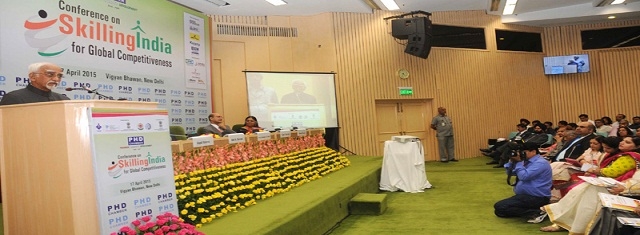News
Skill Building Is A Potent Tool To Improve Individual´s Social Value
Vice President of India

Mr. Mohd. Hamid Ansari addressing the Conference. (Source: PIB/GR/TYP/BIN/USPA/WN)
USPA NEWS -
The Vice President, Mr. Mohd. Hamid Ansari addressing the “Conference on Skilling India for Global Competitiveness“, organised by the PHD Chamber, in New Delhi on April 17, 2015. The VP said that today, significant challenges need to be addressed before we can reap the demographic dividend.
The Vice President of India Mr. Mohd. Hamid Ansari said that skill building will also remain a potent tool to empower the individual and improve his/her social acceptance or value. For us in India, skill development would be critical for achieving faster, sustainable and inclusive growth on the one hand and for providing decent employment opportunities to the growing young population on the other, he added.
Addressing at the “˜Conference on Skilling India for Global Competitiveness´ organized by the PHD Chamber of Commerce and Industry on April 17, the Vice President said that knowledge and skills would increasingly become the primary determinants of economic growth and development. Countries with higher and better levels of skills will adjust more effectively to the challenges and opportunities of growth in a globalized world.In the twenty first century, the competiveness of a country in the global market place would depend on the strength of its economy, its contribution to existing and emerging branches of science and technology, and its ability to respond to the imperatives of a globalising world.
The Vice President said that today, significant challenges need to be addressed before we can reap the demographic dividend. Around 12 million youth enter the work force each year, most with poor education and negligible work skills. Our current skill training capacity is only about 4 million per year. This leads to an inherent skill deficit in the emerging work force.
He said that the latest NSSO Survey indicates that the general education level of over 50% of our labor force remains extremely low and only 10% of the labour force was vocationally trained. It shows that 80% of the entrants to the work force do not have the opportunity for skill training. This means that besides creating employment opportunities for a large and growing work force, we also need to correct the low levels of general education and lack of vocational training of the existing labour force in order to enhance its employability and productivity.
The Vice President opined that Government is cognizant of the importance of skill development for our national development and global competiveness. It has put in place the policy and institutional frameworks and dedicated resources for implementing the national skilling agenda. The realization of this agenda will have to be based on a vigorous partnership between government, suppliers of educational services, industry and civil society. Failure to do so would have serious economic and social implications for the country.
Doruvu Paul Jagan Babu New Delhi Vice President University Mohd. Hamid Ansari Education Skill Economic Development Global Competitiveness
Liability for this article lies with the author, who also holds the copyright. Editorial content from USPA may be quoted on other websites as long as the quote comprises no more than 5% of the entire text, is marked as such and the source is named (via hyperlink).





